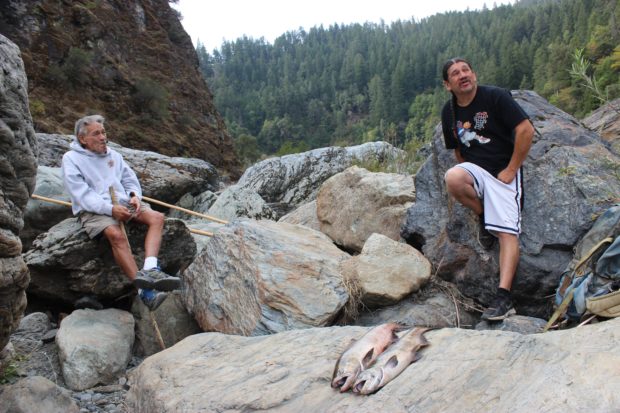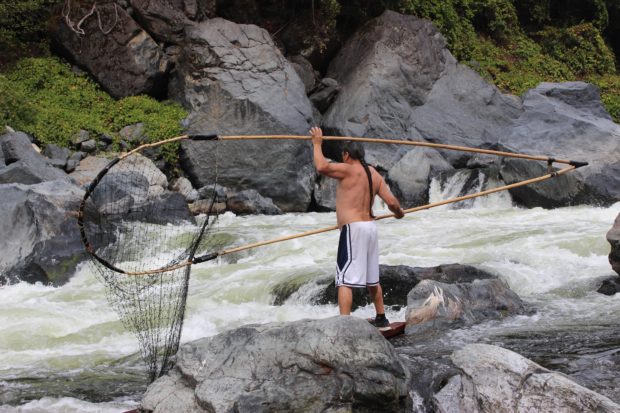 |
Canku Ota
|
 |
|
(Many Paths)
|
||
|
An Online Newsletter
Celebrating Native America
|
||
|
March 2017 - Volume
15 Number 3
|
||
|
|
||
|
Karuk Fishermen at
Ishi Pishi Falls, Still Dipnet Salmon Traditional Style
|
||
|
by Malcolm Terence,
Two Rivers Tribune Contributing writer
|
||
|
Drought, Smaller
Run Reduce Yield, Custom of Sharing Fish Lives On
Brian Tripp is well known for his gifts—poet and painter, sculptor and ceremonial singer—but he has another gift besides. He seems able to talk me into things. I pondered this as I followed his vintage Ford Crown Victoria from the Somes Bar store, slowly down the steep road into Ka'tim'îin, past the ceremony grounds and then to a parking place where the road ends abruptly at a rocky bluff. Down below was the Klamath River and the traditional Karuk fishing spot at Ishi Pishi Falls. A path in that direction emerged nearby. Years had passed, decades, since I'd been down to the falls. It was not easy going. Maybe the boulders we clambered over had grown. Brian is no kid himself but he navigated through the jumble like a goat, if a goat had a bent back like his and a cane. No whining allowed. And then we were there at the river, where the boulders bend the flow into a rapids, a grey-green, grinding flood that has run here since the retreat of the last Ice Age and before. Most years the river has so much power that even the runs of many kinds of salmon, as they return to the waters where they were born, need to slow there in what backwaters and eddies they can find. For millennia, and maybe forever, native people have fished there with small nets strung between long poles. The sole fisherman worked his way in our direction through the boulders and over shaky bridges made of thick planks. It was Ron Reed, a cultural biologist for the Karuk Tribe, and a traditional dipnet fisherman. He greeted Brian and me and Brian introduced Ron to two New Orleans artists in his company. Ron said the fishing had not been good and gestured to a weathered frame back pack that was sitting in the shade. The tails of two fall Chinook salmon protruded through an improvised slash in its top. Hardly any fish, he said. "At least it's a good year for acorns. The creator still looks after us," he added. He began a rumination about how much traditional knowledge was lost since what is politely called "Contact" and is more accurately recognized as the genocide that came with the Gold Rush and the displacement that has continued since. "Nowadays we're fumbling around trying to figure out what to do. When we had a hundred villages, people would learn from someone they admired. There are just a handful of dippers left," he said. "Two handfuls at the most." "One of my earliest memories is coming down here to the falls when I was just four," said Brian. He now lives in Orleans but grew up on the Coast, just coming to the river to visit relatives and attend ceremonies. Ron said he remembered packing out fish when he was very young. "The last couple of years, with so many fish, got us spoiled." He speculated that the river flows were low from the continued drought so all the fishing holes, the side eddies where the fish typically stop for a break in the river's main current, are shallow. "Now the fish can see everything." Brian said he'd heard reports from Yurok fisherman friends where the Klamath enters the ocean and they also suggested a small and uneven run this fall. "They'd get 30 one day and none the next," he said. "We had just a couple days of catching 30, three or four weeks ago around ceremonies or a little bit after," Ron recalled. "What we catch now is insignificant." He explained that different families owned fishing rights in the old days, although when someone, especially an elder, came down the trail and asked for a fish, the fisherman was obligated to share. Sometimes, when Ron would get the fish up to the top, there'd be a couple of elders sitting in chairs, hoping to get some fish. "I asked my mom about it," Ron said, "and she told me that it was an honor to give fish to elders." Then he looked back at the flow through the falls, which looked ample to newcomers, but which he described as "bony, like an underfed dog." He again lamented the lack of fish this year. "Yreka people want fish. Happy Camp people want fish. The system is all out of whack. I haven't even fired my own smoker yet this year. How could I, when other people don't have any fish? I wouldn't feel right." I remembered coming to the falls when I was young at the invitation of the late Willis Conrad, and being amazed by the number and the size of his catch. He would tell me stories of fishermen who'd fallen into the grinding rapids and were swept away. In one story, Willis said the fisherman's remains were found downriver, beyond Weitchpec, being eaten by feral pigs. His stories spoke to caution. And I remembered Willis bringing sacks full of shiny fall Chinook up to the Black Bear commune, which was then just starting and not very well-fed. He never said so, but I thought somehow that he was both amused and fascinated by a band of White people, all of us hippies, who were held to be even lower on the Siskiyou County pecking order than Indians. And his gift of fresh salmon was a welcome change from the beans and brown rice in the standard commune menu. Ron began paying tribute to the people, many of them with Ph.D.'s, who were using their skills and their access to protect the fish and the broader landscape. He began with Kari Norgaard, who teaches sociology and environmental studies at the University of Oregon. Dr. Norgaard and Ron have co-authored several studies. He added more names to his list of the praiseworthy. The Hoopa Valley Tribe for squeezing the Bureau of Reclamation to release more water into the Trinity River at critical times of low flows. And others: Frank Lake, Will Harling, Josh Strange, the Berkeley Collaborative. "They are the ones who would blend the traditional knowledge with the science and then bring it to the table," Ron said. He may have meant the negotiating table where high level talks like dam removal were being parlayed by a room full of agencies and rival interests. Brian said the goal should be to bring a box of traditional
provisions to elders every month. It would include a jar of salmon,
some deer meat and some acorns. Two Karuk men, one young and one old, joined us. After an hour or more of conversation, Ron said it was time to try another pass with the dipnet. Brian offered to be a clubber, the coworker of the dipper who grabs the fish or fish-plural out of the net and whacks them on the head with a short, heavy stick. Jayme Kalal, one of the two New Orleans artists, is a photographer and grabbed his camera to follow them. Ron moved his net expertly through the first hole, probing,
exploring. Nothing. Ron cautioned Jayme that the salmon could see
Jayme's red jumpsuit and suggested he keep a low profile.
Upstream for the second hole. Again nothing. He scrambled over one boulder and skirted another to get to the third hole and Brian followed. And nothing. At the end of six or seven holes, nothing. Ron parked his poles against a boulder the size of a living room, recovered his tee shirt and wiped his brow. Brian glanced around their surroundings, a world of rock piles and driftwood that looked much like the sculpture parts-house in his front yard, or his living room, for that matter. Much of Brian's signature sculpture is a mix of figures, large and small, where the body might be driftwood and the head, a rock that looks like a human face. I call them spirit people and Brian doesn't disagree. As he approached us he picked up a small cobble from the path and turned it to us. It started talking in a rock-people voice, like a sock puppet. "How come you don't ask me any questions?" Brian's rock-puppet said indignantly. "I been here lot longer than any of you." Ron gave one of the salmon to the elder of the pair who had joined us. The man had not asked for a fish but he thanked Ron graciously. Ron explained that he had a work assignment back in Orleans and began packing his gear. Then he gave his second fish to Brian, who also had not asked. |
||||
|
|
|
|
||
|
|
||
| Canku Ota is a free Newsletter celebrating Native America, its traditions and accomplishments . We do not provide subscriber or visitor names to anyone. Some articles presented in Canku Ota may contain copyright material. We have received appropriate permissions for republishing any articles. Material appearing here is distributed without profit or monetary gain to those who have expressed an interest. This is in accordance with Title 17 U.S.C. Section 107. | ||
|
Canku Ota is a copyright ©
2000 - 2017 of Vicki Williams Barry and Paul Barry.
|
||
 |
 |
|
|
The "Canku
Ota - A Newsletter Celebrating Native America" web site and
its design is the
|
||
|
Copyright ©
1999 - 2017 of Paul C. Barry.
|
||
|
All Rights Reserved.
|
||

